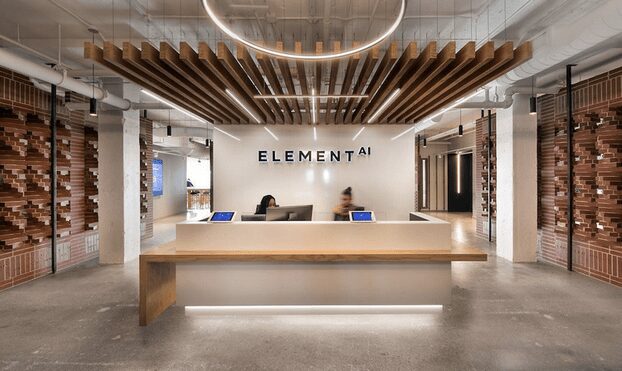The rise and fall of an artificial intelligence star company – Element AI
- Posted by KellyOnTech
- Date January 6, 2021
- Comments 0 comment
Wrote by KellyOnTech, December 31, 2020
If you are an investor, or curious to learn more about investing, would you invest in an artificial intelligence platform company co-founded by a prestigious Turing Award winner and with more than 100 employees with PhDs? It sounds very promising, doesn’t it? Before you answer. Let me first introduce this company.
Element AI was founded in 2016. Yoshua Bengio, the Turing Award winner, was one of its co-founders. For those unaware, the Turing Prize is known as the Nobel Prize in the field of computer science. Element AI’s goal was to make a general artificial intelligence platform.

This company’s Series A financing raised a historic US$137.5 million in funding from a number of well-known investment institutions and large tech companies such as the National Bank of Canada, Canadian Development Bank (BDC), Intel, Microsoft and NVIDIA.
With Element AI’s platform, customers can solve large-scale AI problems by using the mature machine learning and deep learning tools provided by the platform and the best practices for building models. Simply put, you can get help at every stage of the entire life cycle through the platform: from data analysis, model preparation, algorithm optimization, to deployment and production.

Doesn’t it sound great? You don’t have to spend a lot of money to hire experts and engineers in the field of artificial intelligence. There is no need to worry about problems caused by lack of experiences, such as algorithm selection and model building that is not optimal and low model accuracy. In this way, traditional companies can benefit from the efficiency improvement and cost reduction brought by artificial intelligence technologies through this platform.
To date, Element AI has raised a total of 340 million Canadian dollars ( around 257 million US dollars) in funding. But by the end of November this year 2020, Element AI has been acquired by ServiceNow, a Silicon Valley software company. According to “The Globe and Mail” report, Element AI sold for less than $500 million. The purchase price was much lower than the company’s valuation after the 200 million Canadian dollars Series B financing conducted in September 2019. ServiceNow only retains the company’s technical elites, and Turing Award winner Yoshua Benjio will serve as their senior consultant. The rest of the employees were all let go.
Why has Element AI, which was highly sought after by government and technology giants been sold at such a low price? There are three major reasons:
1.Data processing and analysis
In order to be able to provide the industry with best practices and solutions for models, Element AI relies on cooperation with large companies. We know that the data processing cycle is very long, from data screening, including inputting documents and manual information into the platform, data cleaning, selecting key variables and so on. Especially for the selection of key variables, people with rich industry experience and professional knowledge are required as support, not just experts in artificial intelligence.
2. Out of focus
Element AI originally wanted to design a universal platform to provide algorithms and computing power support for companies in various industries. The company had a total of 8 vertical solutions. We know that artificial intelligence is a comprehensive discipline. If you only understand machine learning and algorithms, without the knowledge and experience in the professional field, you cannot make useful and targeted solutions.
3. The monetization model was not clear
Element AI had long relied on government support and Series A and B rounds of financing to support its high operating costs. The business model was not clear, and the meager income eventually resulted in massive layoffs.
These are the three main reasons the company was sold at such a low price. As an investor would you have foreseen these problems? To be successful and profitable a company needs a long-term sustainable business model.
Does your company have a long-term sustainable business model? You are welcome to contact us. We will help you refine and upgrade your business model.
I also shot a video for your reference.
You may also like

The AI Paradox: Your Story as the Ultimate Unfair Advantage
AI越聪明,创始人越要会讲故事——科技公司的隐形增长引擎
一、当AI能写代码、做PPT,创始人的真正护城河是什么? AI可以复制你的产品、代码和定价模型,却无法复制你的初心与使命。 上周,我们齐聚 Mans International 二月专场,深入探讨了“AI 悖论”:在技术极易被模仿的时代,讲故事不再是软技能——而是科技创始人唯一可防御的护城河。以下是本次关于「战略叙事矩阵」深度研讨的精华回顾。 “为什么要相信你?”——这是每一位技术创始人都需直面的灵魂拷问。在注意力稀缺的当下,功能清单只是噪音:功能说明“是什么”,而故事才能点燃信任。真正的突破,在于搭建战略叙事体系——将技术与人类深层渴望精准对齐。 这绝非所谓的“软技能”,而是你最锋利的竞争武器。 二、构建故事力的三大战略框架 框架一:定义范式——从行业标准制定者到文化符号创造者 案例深度解构:潘通的色彩影响力 色彩解决方案公司潘通的真正智慧,不在于发布了多少种颜色,而在于它将色彩这一通用语言,成功私有化为自己的叙事体系。 策略拆解: 潘通将自己的解决方案,升维为行业的解释框架。当你能定义他人用于表达的工具时,你就掌握了无形的话语权。 框架二:重构战场——从功能竞争到意义竞争 案例深度解构:Left Field 约会APP —— 在红海中开辟蓝海 在拥挤的社交应用市场,Left Field 没有陷入“更好算法”的军备竞赛,而是进行了一次精准的叙事跃迁。 策略拆解: 当功能陷入内卷,Left Field 将竞争维度拉升至价值观层面。最有力的产品定位,是让用户通过使用你,完成自我身份的构建。 框架三:技术人性化——让AI拥有温度的故事艺术 案例深度解构:Petco …


